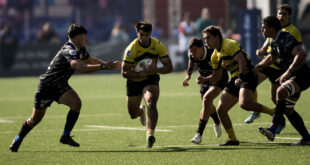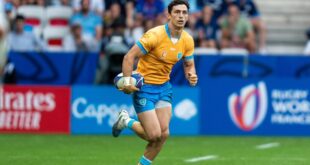The Scottish Rugby Union and Head Coach have clashed over Player Eligibility Laws. With Scotland being one of the world’s predominant benefactors of the three-year residency rule the words of the national coach are all the more powerful.
Head Coach Vern Cotter has backed the widespread calls to change the controversial law. He believes that World Rugby ought to increase residency qualification from three years to five, matching that being called upon from senior World Rugby staff and a growing number of unions.
Cotter selected WP Nel, Josh Strauss and Tim Visser for Rugby World Cup 2015. With no prior caps for South Africa or Holland all three qualified after playing three years for Edinburgh or the Glasgow Warriors. In the case of Strauss he qualified just one week before the World Cup got underway.
All three were named by Cotter for the upcoming Six Nations campaign. Nel, though, has been forced out through injury. The number has not fallen, however, as Cornell du Preez has become the latest South African selected by the national coach.
Speaking at the 2017 Six Nations launch this week, Cotter said: “I think it will probably go to five years and that is probably a good thing.” His comments come in the same month in which three Six Nations rivals all backed Agustín Pichot’s proposal. England, France and Wales have all officially changed their position to back the proposed change.
Their newfound support for Agustín Pichot’s proposal means that in all likelihood 2017 will be the final year of international competition played under three-year eligibility rules. It means that Scotland is joined by Ireland and Italy in not declaring their position. All three benefit from the existing laws.
The Scottish Rugby Union actively identifies and signs players with an eye to becoming Scotland internationals. It is true not only of uncapped players like du Preez, Nel, Strauss or Visser but also of those qualifying via their parents or grandparents. Ali Price is a foreign-born and raised player who was brought in to become captured by Scotland through eligibility. Both Ireland and Italy pursue similar behavior.
Cotter acknowledges that it is indeed widespread. “We have used the three-year rule the same as everybody else,” he commented. “I think the general consensus is that it should go to five years. I’m not a decision maker and I just adapt to whatever decision is made. My job is to try and win games.”
The pressure to win has reached crisis point this past November. All four wingers in France vs Australia this past November were Fijians. England and New Zealand both also fielded Fijian players captured via three-year residency.
Yet, now all four of these unions are seemingly on the side of Pichot. The Australian media has reported that Australia, a former defender of three year eligibility, is now to to support change. The four SANZAAR unions – Argentina, Australia, New Zealand and South Africa are now said to be voting as a block.
In order to pass the law to five years 75% of voters will be required to pass the bill. Based on who carries voting power and the declared or likely position the potential for change is very high. As shown below the change could go through with 28 to 10 being the potential outcome.
DECLARED OR LIKELY POSITION
For Change – Argentina (2), Australia (2), Canada (2), England (2), France (2), New Zealand (2), South Africa (2), Wales (2), Georgia (1), USA (1), World Rugby Chairman (1), World Rugby Vice Chairman (1), Africa (2), Europe (2), Oceania (2), North America (2), South America (2)
Against Change – Ireland (2), Italy (2), Scotland (2), Japan (1), Romania (1), Asia (2)
 Americas Rugby News Rugby news from across the Americas!
Americas Rugby News Rugby news from across the Americas!




